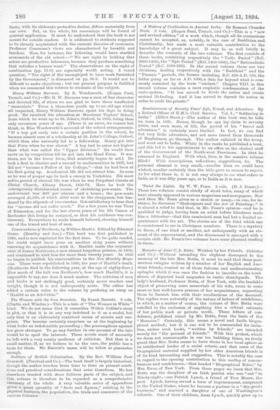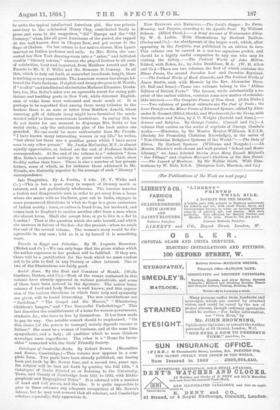Memoirs of Anne C. L. Botta. Written by her Friends.
(Isbister and Co.)—Without intending the slightest disrespect to the memory of the late Mrs. Botta, it must be said that these post- mortem eulogies written by a number of her English and Ame- rican friends, remind us of those fulsome and undiscriminating epitaphs which it was once the fashion to inscribe on the tomb stones of departed local magnates in rustic churchyards. The lady's husband, Professor Botta, of New York, with the laudable object of preserving some memorials of his wife, wrote to some more or less well-known persons of her acquaintance, requesting them to furnish him with their recollections of the deceased. The replies were naturally of the nature of letters of condolence,. in which, as a matter of course, the virtues of Mrs. Botta were- extolled to the exclusion of anything like a critical estimate of her amblie work or private worth. These letters of con- dolence, published intact by Mr. Botta., form the basis of the " Memoirs." Certainly, this seems a novel and facile biogra- phical method ; but it is one not to be commended for imita- tion, unless such books, "written by friends," are intended merely for "the perusal of friends." With this protest, which we deem not unseasonable in our too babbling times, we freely grant that Mrs. Botta seems to have shone in her local sphere as an intellectual leader of a social coterie, and that some of the biographical material supplied by her older American friends is of its kind interesting and suggestive. This is notably the case in regard to the opening contribution to this medley of remem- brances and condolences,—that headed "Biographical Notes," by Mrs. Ewer, of New York. From these pages we learn that Mrs. Botta was the daughter of an Irish patriot who was "out" in Ninety-eight,--one Patrick Lynch, a friend of Tom Moore, the poet. Lynch, having served a term of imprisonment, emigrated to the United States, where he became a partner in a "dry-goods business," and married a daughter of one of Washington's colonels. One of their children, Anne Lynch, quickly grew up to'
be quite the typical intellectual American girl. She was private secretary to the celebrated Henry Clay, contributed freely in prose and verse to the magazines, " did " Europe and the "Old Country," when, like all good Americans of the period, she rapped at the well-known door in Cheyne Row, and got access to the Sage of Chelsea. On her return to her native shores, Miss Lynch married an Italian professor and exile. As Mrs. Botta, she con- verted her New York drawing-room into a "salon," and initiated weekly "literary soirkis," whereat she played hostess to all sorts of celebrities, local and imported, from Matthew Arnold and Mr. Froude to Mr. N. P. Willis and Mr. Moncure D. Conway. In all this, which is duly set forth at somewhat inordinate length, there is nothing so very remarkable. The American woman has always fol- lowed the Paris fashions. If stylish and dressy she goes to M.Worth; if "soulful" and intellectual she imitates Madame Recamier. Doubt- less, too, Mrs. Botta's salon was an agreeable resort for rising poli- ticians and budding poets in New York, while itinerant English- men of wider fame were welcomed and made much of. It is perhaps to be regretted that among these many tributes to the hostess there is no note or letter from Matthew Arnold, whose unerring gift of delicate irony might have furnished the much- needed relief to these monotonous laudations. In saying this we do not desire for one moment to disparage Mrs. Botta or her social circle; only the unfortunate plan of the book makes one guarded. No one could be more enthusiastic than Mr. Fronde. 'I have known many interesting women in my life," he writes, "but about her there was a peculiar grace which I have never seen in any other person." Mr. Justin McCarthy, M.P., is almost equally appreciative, as indeed are the rest of Professor Botta's correspondents. At the end of the volume is a" selection" from Mrs. Botta's scattered writings in prose and verse, which show facility rather than force. There is also a number of her private letters, some of which, as for instance those addressed to Mr. Fronde, are distinctly superior to the average of such "literary" correspondence.



































 Previous page
Previous page